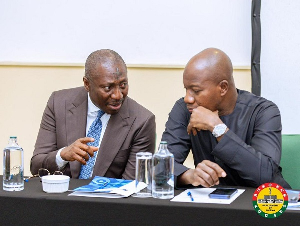Yes, they say that opinions are like noses, everybody has one; and can differ. I’ve always believed in the statement made by John Wesley in the 18th century (1776), when at the funeral of George Whitefield, he said that we must agree to disagree. For me, that is the beauty and essence of democracy. Most of the conflicts that have ravaged our continent and some parts of Asia could have been avoided if we had simply appreciated this sage of his. That is why I do appreciate the opinions of Mr. Yaw Opare Asamoah (refer: Re: The bestiality of tribal bigotry, 23.2.2010) to my article published on this forum on 2.2.2010, although I disagree with some of the arguments he tried desperately and unconvincingly to put across.
Again, I wouldn’t have bothered responding to his rejoinder, but for the fact that, after perusing an article he authored on 30.1.2009 titled, “The Ewe Factor In The Political Discourse Of Ghana,” I realized that he might be doing the right thing, but the approach is completely wrong. In other words, he might be causing more harm than good. In the said article, he suggested among other things, that Ewes are from infancy, taught to hate Asantes. But, Mr. Asamoa, this allegation can never be true; or at best the example you cited, if true was an isolated occurrence. Why should you in the first place use a single person’s testimony to draw an overriding conclusion? This is totally unacceptable, buddy. I am an Akan (a kwahu to be specific), but was raised up in Kumasi (the Garden City); and I’ve enjoyed great friendship with Ewes, Frafras, Mamprusis, Asantes, etc. etc.
Now, let’s critically examine some of the issues he raised in reaction to my article on the above heading. In his preamble, he quoted my revelation that the New Patriotic Party is using the same tribal card against the ruling National Democratic Congress in retaliation to what the former opposition NDC meted out to them. Sir, didn’t the likes of Dr. Tony Aidoo and a bunch of NDC leading figures use the tribal card to demonize the NPP, not only as an Akan party, but rather an Asante party? And you think they were making such allegations out of sincerity, sir. So, the New Patriotic Party is bent on using that same tool as a pay back to wrestle power from the present government. And that is a false start; it doesn’t bring about growth and development, but rather retrogression. We are at a point in our democratic development where the right methods have to be utilized in addressing some of the problems that are perceived to mitigating our quest to moving forward. I didn’t say in my article that the allegations about perceived tribalism in our body politic are baseless unless you deliberately decide to overlook the succeeding sentences.
This is what I said: assuming the concerns raised are true, which are obviously baseless, except to win political power, what's wrong about that? Are they not citizens first, before their tribal or political leanings? What these promoters of tribal prejudice fail to tell us, and I think is very important, is whether those people who are accused of holding their positions as a result of tribal considerations are qualified in terms of competence and ability to deliver. If they cannot tell us the bases of their appointments, and instead, use their tribe or ethnicity as the criterion for their appointments just because of the eccentric nature of their names or their geographic origins, then I think they are deliberately and diabolically doing the nation a monumental disservice. So why the effusions, Mr. Asamoa? You are doing exactly what I am saying; I will prove it to you later on, so hold your breath. The point I was trying to put across is this: there is no need to suggest that a given government is tribalistic when it comes to political and other appointments unless we can prove beyond all reasonable doubts that it is.
Before we can draw any meaningful conclusions, Mr. Asamoa, provide us with the reasons why you think only tribal consideration was the only indicator that was used in giving these individuals their respective appointments. We all know that in political appointments, several reasons are considered before one is selected; that is a fact. So it’s not only tribal, right? Some of the considerations are merit, loyalty, financial contributions towards the party winning power, strategic reasons, among others. Listen, people jockey for positions when it comes to political appointments. Don’t you think you would have helped your case and readers if you had told us why you think any of these references were not considered?
Also, I think Mr. Asamoa is confusing issues here. I don’t know what the words “people” and “area” in his article mean when he said that Cletus Avoka, then as minister of interior used his position to help some students at his area gained admission to the GIS at Assin Fosu. Is he equating these words to tribalism? He would have done himself and readers on this forum a huge benefit if he had told us why area and people in his submission are synonymous to tribalism. In this day and age, most words assume several meanings, and tribe is not an exception. Based on this discussion, I would like to utilize the commonest of the definitions of tribe in making my case. According to the Archaeological dictionary, a tribe is a group of indigenous persons, families, or clans believed to be descended from a common ancestor and forming a close-knit community under a defined leader, chief, or ruling council. With this definition, how does he attribute the behavior of Cletus Avoka, to be tribalistic? Since when did an area or region or people become synonymous with tribe? Mr. Asamoa, is it not possible that these people you are talking about, coming from this area, belong to different tribes and ethnicities? This is why I said in the preceding paragraph that unless you were being disingenuous, there was no need to decouple my view that all the tribal effusions are baseless without recourse to other considerations, such as merit and ability to deliver.
That is why I keep saying that we should be careful the way we try to use tribalism to achieve political ends. I would expect him, if he wills, in his next rejoinder to this write-up provide us with the distinct tribes of the students who were given that (privilege). If this act was done with a flagrant disrespect to lay down procedures—such as merit, as the author seems to suggest, then Mr. Avoka was damn wrong and need to be condemned in no uncertain terms. But, this unacceptable act is not tribalism; but a clear case of abuse of one’s office! Again, why is he assuming that the appointment of Alban Bagbin, John Tia, Martin Amidu, Mahama Ayariga, and Inusah Fuseini is tribalistic? The fact that they come from the northern part of Ghana, doesn’t mean that they are from the same tribe, sir. The northern part of Ghana, consisting of the Northern, Upper East, and Upper West regions are made up of people from different tribes and ethnicities. So why don’t you tell us the individual tribes that they originate from in order to properly interrogate your beef? You see his problem, he is basing his arguments on assumptions, but assumptions are not absolutes—they could be true or false.
Again, in his reaction to my observation that the beauty of politics lies in the use of constructive debating of issues, explanation of the channels of realizing designated programs and policies geared towards improving the lots of the people, and not the reliance on ethnocentrism, he again missed the point. According to his opinion, the above observation is too simplistic in the sense that, it is not achievable (because of its idealistic appeal). He averred, “Yes we may all want to see that happening, but that is the ideal situation which is a far cry from what is happening now on the ground. Nobody knows what the other person is thinking in the head unless and until that person says or does something.” If the observation I made above is not the essence of democracy, then I think we are practicing a different form of democracy—a democracy that is based upon intolerance and the flexing of one’s opinionated muscles. Although, the point I made doesn’t have the connotations of idealism, which is a steep slope, and also non-realizable; I believe, when people aspire for the ideal, it would help them in realizing their goals than dwelling always on realities. Why do we strive for excellence? We do so because we want to near the ultimate. That is the language of the optimists; that is why people, who have been able to achieve great heights in this life, although were seen by realists as “idealistic fools”, didn’t quit on their dreams, but kept on fighting towards the ideal. We might not achieve idealism, but we should understand that when we push towards idealism, we might get close to achieving excellence. As Les Brown once said, shoot for the moon, and in case you miss it you might fall among the stars.
Furthermore, his assertion that Ghana has never been one people is not totally correct. This is what he indicated “Throughout the history of this country, (then Gold Coast), we have always been a group of different peoples; and that is how it has been since. If we were one people, how did it happen that, in the fight against British Imperial rule, certain tribes fought on the side [on] Britain against fellow peoples of the Gold Coast? If we were one people would the office location for the former president be an issue?” Mr. Asamoa, the fact that we don’t think in the same direction doesn’t mean that we are not the same people. As George S Paton indicated, “If everyone is thinking alike then somebody is not thinking.” Before and after independence, our approaches to resolving issues have been different, but it doesn’t in anyway mean that because we think differently, we aren’t the same people; we are!
That is why I disagree with people, like Kwesi Pratt jnr and associates who attribute our independence to only Kwame Nkrumah of blessed memory. The bottom line is that the UGCC had a plan to the achievement of independence, and the CPP also had a different plan; but the end goal was the same—the attainment of independence. During the American Revolution, some of the folks (loyalists) fought alongside the Brits, and the patriots fought against the Brits alone. We cannot fault those who fought alongside the Brits, simply because they thought the modus operandi of the patriots was not acceptable, they might be wrong though; and that were acting ultra vires. If we disagree on issues, even those of national importance, it doesn’t mean that we are not one people. It is because, we are all thinking; although differently.
Moreover, on your beef about the pronouncement of Professor Kofi Awoonor that he is an ewe first before a Ghanaian, I agree with you that he was bloody wrong. The pronouncement was unfortunate and also despicable to say the least. But as Barack Obama has indicated, we should live in hope and not in fear. And also should not assume that because Kofi Awoonor has embarrassed himself by making such a misguided pronouncement, all those who come from his tribe should be treated with the same measure. Obviously, some will; and those are the tribal bigots I referred to in the first article. I still maintain that we are Ghanaians first before our tribes. We are born into tribes, I agree; but before a tribe, there was society, there was Ghana.
Finally, I do appreciate your concern for an equitable representation regarding political appointments in the country, but my worry is about your prescription—that ministerial appointments should be based on ethnic or tribal balance. I think in the 1992 constitution, there is the provision for regional (and not tribal) balance when it comes to cabinet appointments. I also do understand that almost all tribes in the country are represented at the National Assembly. And don’t forget that the districts and municipal chief executives are the umbilical cord linking the people at the grass roots to the president. The development of the country will suffer, in my estimation if we reduce ministerial appointments to tribal affiliations at the expense of competence and merit. This should never be done in any country that is aspiring to improve their economy. A country that wants to progress, makes impact in the lives of her citizens, should do her best to eschew these tribal supremacy, and go for the best brains in moving their economies forward. If Kufour appointed more Akans (Asantes) in his government, I don’t think it was done deliberately; in the same vein, if Mills has been caught in the same net, I don’t think it was done purposefully. If this is a problem, we could collectively solve it without making tempest in a tea cup.
I think, and I believe I’m not wrong that it’s those politicians, who think that politics is the only avenue of being in money that use the tribal card unnecessarily to capture political power. That is what the NDC did, as you rightly said and made the construction of the presidential edifice an unnecessary tribal issue. And after wasting tax payers money (and grant from the Indian government) to construct this magnificent presidential edifice, our seat of government is still at the castle—a symbol of servitude and slavery. It is high time that the Osu castle was used as a tourist destination to earn the country some revenue. The president should respect Ghanaians and move to the Jubilee house. It doesn’t make sense for him and his government to abandon the “Black” house when we know that anytime the NPP regains power, they will move in there.
And if we would listen, and I think majority of Ghanaians are, we should be wary of the way we are reducing our politics to tribal bigotry. There are ewes and northern tribal and ethnic groups who are members of the NPP, although those tribes are a fortress of the NDC. On the flip side, although the Akan tribes (particularly the Asantes, Kwahus, and Akims) are a known stronghold of the NPP, we all know for a fact that some of them are recognized activists, supporters, and sympathizers of the NDC. Mr. Asamoa, I would suggest that in your next rejoinder, you do your best by clearly defining tribalism in relation to examples you adduce. It’s like you are confusing a whole lot of things from “arealism”to “peoplism”to regionalism, and tribalism. God bless Ghana!!
Source: Kingsley Nyarko, PhD, Psychologist & Educational Consultant, IAF- Munich, (kingpong73@yahoo.com)
Opinions of Thursday, 18 March 2010
Columnist: Nyarko, Kingsley














